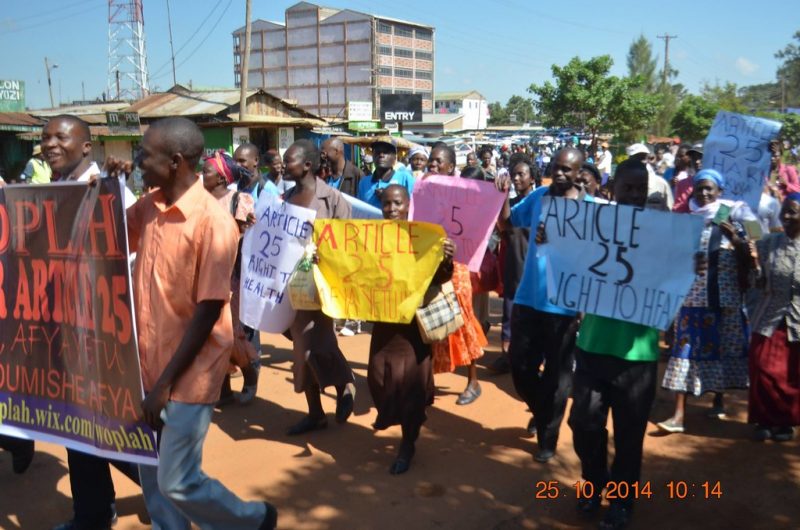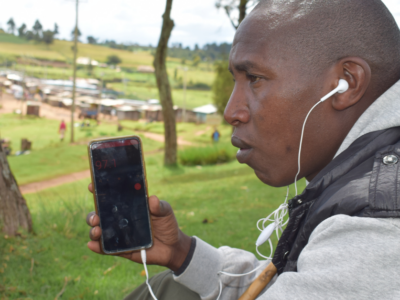
Article 25's Global Day of Action for the Right to Health in Kenya. Photo by theteam25 (CC BY-SA 2.0)
Reproductive rights in Kenya is an intimate and emotive topic where hard lines have been drawn on both sides. Pro- and anti-abortion campaigners keep cycling through episodes of heightened attention when high-profile cases arise and passions continue to run high. Meanwhile, the country registers numbers of unsafe abortions that are among the highest in Africa. Maternal mortality is high at about 6,000 deaths per year, 17 per cent of them from complications of unsafe abortion.
Limited legal recourse to access termination of pregnancy is a potential compromise that remains contested, leaving the two camps with a status quo that seems hard to shake off. What's at stake on both ends of this fiercely debated issue?
On one side, some feminist and human rights advocates, such as those who rallied behind the #KeepWanjikuSafe campaign in 2020, are eager to see reproductive rights extended. This would help prevent more deaths through unsafe abortion practices, which claim the lives of seven women every day and cost public health facilities over 500 million Kenyan shillings every year in post-abortion care, according to research published in 2018 by the African Population and Health Research Centre (APHRC) and the Kenyan Ministry of Health.
On the other hand, “pro-life” groups argue that the Constitution already provides too many loopholes, which could allegedly lead to what they term “abortion on demand.”
The anti-abortion position comes mainly from religious groups and is led by CitizenGo, a foundation with links to Spain’s far right, that is active in several countries to curb legislation on a range of social issues, from same-sex marriage to sex education to abortion.
In Kenya, CitizenGo launched a petition against the local chapter of Marie Stopes, an international NGO offering free sexual and reproductive health services including abortion, leading to a ban on the NGO in 2018 that was lifted a month later. CitizenGo's most prominent representative in Kenya, Ann Kioko, also sits on the board of Kenya’s Conference of Catholic Bishops and has connections to US-based anti-abortion and anti-LGBT groups, such as the Center for Family and Human Rights (C-Fam).
The most recent iteration of this debate happened last year when the Reproductive Healthcare Bill 2019 sponsored by Senator Susan Kihika was proposed to consolidate the “right to the highest attainable standard of health, including the right to reproductive healthcare” enshrined in Article 43 of the Kenyan Constitution. Much more ambitious than the 2014 bill that preceded it, this piece of legislation proposed to make prenatal, delivery, and postnatal services free for every woman in Kenya, outlaw forced sterilization, regulate surrogacy and provide a more solid framework for sex education.
Both bills, however, have stirred controversy over similar questions, most poignantly the twin issues of access to abortion and the dissemination of accurate information about sexual health aimed at teenagers. Those opposed to the 2019 bill have called for it to be shelved, claiming that it amounted to a
“back door legalization of abortion.”
The bill has since been temporarily withdrawn to allow for further public consultation, possibly leading to redrafting. Quoted in Business Daily, Mercy Mwangangi, the Chief Administrative Secretary (CAS) of the Ministry of Health justified this decision on grounds that the bill is:
“defective” and “vague on the emotive technical issues of sexual and reproductive health and rights (SRHR) and assisted reproductive technology (ART)”.
While it makes some bolder proposals, on the contentious issue of abortion, the Reproductive Healthcare Bill of 2019 does not challenge or modify the Kenyan Constitution adopted in 2010, which makes abortion legal only in specific cases, namely if a medical professional deems the health or life of the mother to be at risk, or if an emergency operation is needed. According to a 2019 Supreme Court ruling, these provisions include pregnancies that resulted from rape. Meanwhile, assistance in procuring an abortion outside of these circumstances is still severely punished by the Penal Code.
This matter threatened to tank the entire constitutional reform project in 2010 as anti-abortion campaigners—chiefly Catholic and evangelical Christian religious leaders—appealed to voters’ religious sentiments to reject the draft on grounds that it would “legalise abortion.”
Focus on abortion obscuring other reproductive health matters

Refugees receiving care at a hospital in the Ifo 2 Refugee Camp in Dadaab. Photo by World Bank Photo Collection (CC BY-NC-ND 2.0)
Meanwhile, doctors still lack clarity and training on how to perform safe abortions and are hesitant to proceed in the absence of a reassuring legal framework.
The laser focus on abortion also obscures other reproductive health matters that rarely have a chance of being discussed in the midst of this cacophony. Stephanie Musho, a Nairobi-based human rights lawyer with expertise in gender and reproductive justice, explains what public debates are missing:
The bill outlaws forced sterilization. In this country, women —particularly those living with HIV—have been forcefully sterilized because of the thinking of certain health care providers who feel this is the best way to stop the transmission of the virus from mother to child, even though we know that women living with HIV, for the longest time, have been able to get pregnant, carry the babies to term, and give birth without transmitting the virus. […]
The bill promotes the right to privacy and the right to consent. When you look at patients who have mental health disorders, a lot of times, decisions are made for them. […] We are not just going to make decisions for people about their bodies just because they have mental health conditions.
Tagged “the abortion bill” by its opponents, the Reproductive Healthcare bill of 2019 is, in fact, a comprehensive document that only mentions termination of pregnancy in five articles (art. 26-30) out of 39.
The bill had three major goals: to ensure access to reproductive healthcare countrywide through state and county efforts, including adequate budgetary allocations; to regulate assisted reproduction services, such as IVF and surrogacy; and to clarify the framework for access to reproductive health services by teenagers.
In an interview on Milele FM in July 2020, the bill’s sponsor, Senator Kihika, clarified her initial intent:
What drove me to come up with the bill was majorly to help couples that could not be able to conceive. I wanted to come up with a legislative framework that could bring in IVF and surrogacy. In my role as a representative of the people over time, I have come across couples who could not get the services. Even though it is available, there are no laws that govern it and it is extremely expensive that only the very wealthy in the society are able to access.
Although it falls short of authorizing same-sex couples to access surrogacy, the bill seeks to establish every person’s right to access reproductive health services (art 7.1) and assisted reproduction (art. 9.1) as well as standards for written informed consent in matters related to reproductive healthcare.
If the bill passes, the Births and Deaths Registration Act would also be amended to facilitate a child’s registration at birth by a parent or parents of a child born through surrogacy, to avoid the legal imbroglio of having the surrogate mother automatically registered on the birth certificate, as is currently the case.
Senator Kihika further reiterated that religious perspectives have been adequately taken into consideration in the drafting of the bill:
I am a Christian and the context of the bill also accounts for our religious background. The bill also encourages abstinence but also offers counselling on the consequences of things like abortions.
What ultimately gets lost in the pro- vs. anti-abortion debate is the hope to move forward with legislation that could pave the way for millions of Kenyan to access a range of safe reproductive health services.





